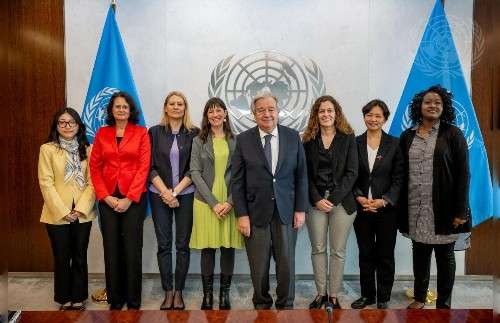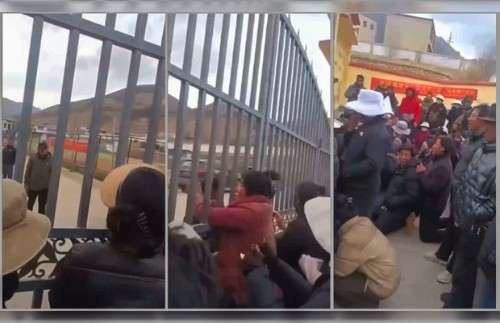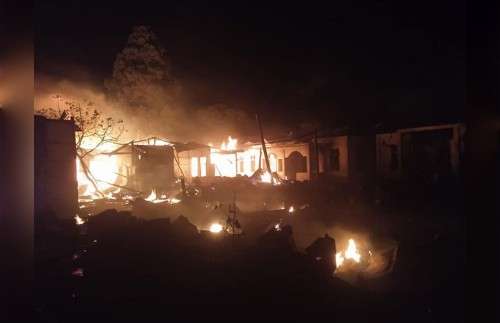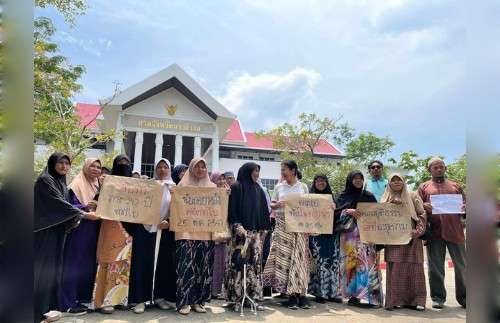
Chinese special economic zone in Laos has fallen silent, workers in Cambodia staged a strike after their factory closed for lack of inputs from China, and Myanmar grappled with plant closures and layoffs, as the economic fallout from the coronavirus cascaded across the region.
In Laos, which has yet to report a confirmed case of COVID-19, the developer of the Boten Special Economic Zone (SEZ) in Luang Namtha Province bordering China, has suspended all construction and closed stores and restaurants – largely because few Chinese managers, technicians or tourists are showing up.
“Only a few (workers) are working because a great number of Chinese couldn’t come back. Only a limited number of necessary personnel are present,” an employee of the Yunnan Hai Cheng Group in the Boten SEZ told RFA’s Lao Service.
The employee added that the Boten SEZ, where massive construction work has been underway to create a tourism and trade hub near the entry point into Laos of the $6 billion China-Laos railway, is very quiet, with the duty-free shops that usually draw Chinese tourists empty.
Work on the China-Laos railway, which is due to open in December 2021, has slowed because Chinese managers and workers who had gone to China for the Lunar New Year holiday in January did not return after the coronavirus outbreak hit central China.
“There has been no work for more than a week now. We all stopped working because it’s too risky and scary,” a driver for a Chinese trucking company in Oudomxay Province told RFA.
“Government projects have also been suspended. We depend on customers from China,” he added.
The Lao government ordered all border check points on the frontier with China except the crossing at Boten closed since early February, and now only essential cargo and businesspeople are allowed to go through the Boten border gate.
Last week, Lao Airlines executive Bounma Chanthavongsa told local media that the state-owned airline has laid off one 1,000 staff, or half of its work force, after all flights to China and South Korea were suspended.
At one plant that has remained open—“Hi-Tech Lao Apparel, a big garment factory in the capital Vientiane—“we don’t have plans to close the plant down. We just advise our workers to protect themselves by wearing facial masks,” a worker told RFA.
‘Ripple effects’
Laos’ struggle is playing out across the region, as countries that have so far avoided suffering major outbreaks of coronavirus – which has killed 3,460 and infected 101,490 worldwide—face the economic fallout.

“The virus’s ripple effects have hampered the economies of nearby countries, especially in Southeast Asia, in three main ways: by curtailing the number of Chinese tourists, disrupting China-centric supply chains, and putting a damper on economic demand in China,” Trinh Nguyen, a Hong Kong-based economist, wrote in an analysis for the Carnegie Endowment for International Peace last month.
In Cambodia, more than 5,000 textile workers have become unemployed in the last two weeks, due to the closure of factories over the impact of Corona virus outbreak, according to government figures.
About 800 of more than 4,000 workers at the Crystal Martin factory in Kandal province went on strike Thursday after the factory has failed to pay them in the wake of suspending production from March 5 to April 30 due to a lack of raw muaterials from China.
Worker Khem Srey Neth told RFA’s Khmer Service that the factory management promised to pay 40 percent of their average $190 monthly wages, which is supposed to be matched by 20 percent paid by the government, but had not paid them.
Tith Ron, union representative at the factory, told RFA that he heard that the factory will give workers pay checks Friday or Saturday. RFA couldn’t reach the factory for comment.
On Thursday, Ath Thun, president of the Cambodian Labor Confederation, said 33 factories have closed and more than 17,000 workers have been suspended from their jobs at the request of factory owners as a precautionary measure against possible virus outbreaks.
And Ken Loo, secretary general of the Garment Manufacturers Association in Cambodia (GMAC), also told RFA that more than 30 factories had closed temporarily, affecting about 20,000 workers in early March.
In the Yangon region of Myanmar, three textile and shoe factories in Shwepyithar and Hlaing Tharyar industrial zones closed on Friday, leaving more than 2,000 workers out of job.
“We’ve got three more factory closures this morning,” said Phyo Sandar Soe of the Confederation of Trade Unions of Myanmar. She said the ministry of labor had already announced 13 previous closures.
Supply and demand problems
The CTUM estimates that there are over 500,000 textile workers in the Yangon region, with around 300,000 in Hlaing Tharyar Industrial zone alone. The textile sector earns some $3.4 billion a year for Myanmar.
“There are factory closures and downsizing of labor forces,” said Phyo Sandar Soe.
In one textile plant, the Lucky Sky factory, “The employer has terminated all 517 full time workers and hired 100 back on daily wages,” Phyo Sandar Soe told RFA’s Myanmar Service.
“Some factories have proposed downsizing the labor force from 1000 to 300. Some factories want to close down completely,” she said.
Most factories in Myanmar rely on raw materials from China, in some cases as many as 90 percent.
“Currently we’ve got two problems,” said Aung Soe, permanent secretary of Myanmar’s Ministry of Commerce.
“It started with shortage of the raw materials, most of which come from China,” he told RFA.
“Second, the outbreak hit the countries which imports our products, so trade has become sluggish or completely stopped,” said Aung Soe.
The commerce ministry official added that “the inflow of raw materials has begun again now, and cargo traffic through border trades has increased gradually, although it is not back to the regular volume.”
Kyaw Myo of the Burma Federation of Trades Union urged the government to address the drop in demand driven by the epidemic by talks with foreign countries to “let the importers know that there is no coronavirus outbreak yet in Myanmar.” The importers may have concerned about the potential hazard of the products they are importing.”
In a report issued in mid-February, the ASEAN+3 Macroeconomic Research Office (AMRO), a Singapore-based macroeconomic surveillance organization, projected that the virus outbreak and slowdown in China would result in a deduction of 0.4 percentage points from the economies of ASEAN’s ten members, plus China, Japan and South Korea.
“The regional economy will be impacted by (1) a sharp drop in Chinese outbound travel and tourism, (2) a drop in regional travel and tourism, (3) a decline in China’s imports through the supply chain, and (4) the transmission of the virus to regional economies,” AMRO wrote.
Reported by Nandar Chan for RFA’s Myanmar Service, and by the Khmer and Lao Services. Translated by Ye Kaung Myint Maung, Samean Yun and Max Avary. Written in English by Paul Eckert.
Copyright © 1998-2016, RFA. Used with the permission of Radio Free Asia, 2025 M St. NW, Suite 300, Washington DC 20036. https://www.rfa.org
Report Warns,Climate Change Set to Cut Average Income by 19%
Timor-Leste Seeks Economic Lifeline as Oil Wealth Dwindles
South Africa Prepares to End Lion Hunting in Captivity
UN Secretary-General Meets with Working Group on Discrimination Against Women and Girls
On Both US Coasts,Pro Palestinian Encampment Protesters Hold Ground
Philippine Police Arrest 3 Suspects Over On-Air Killing of Broadcaster
In Tibet, Parents Plead for Children to Help Collect Caterpillar Fungus
Vietnamese Monk Seeks Justice for Brother Who Died after Police Interrogation
Subscribe Our You Tube Channel
Fighting Fake News
Fighting Lies














